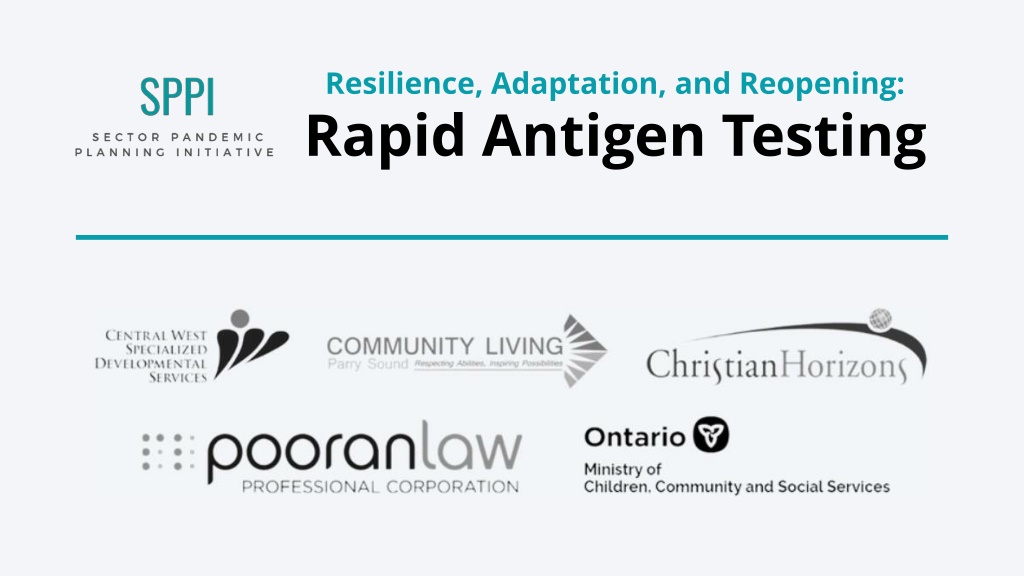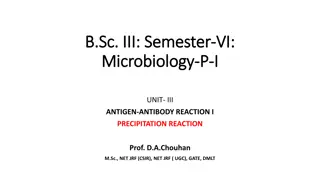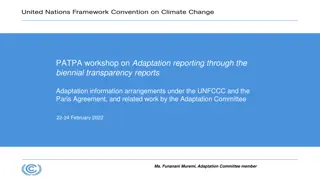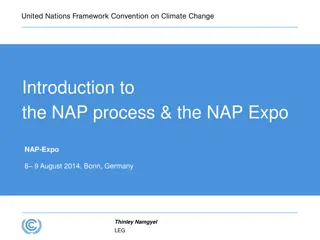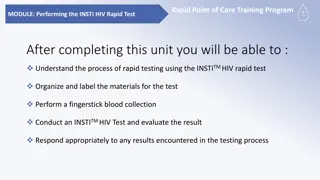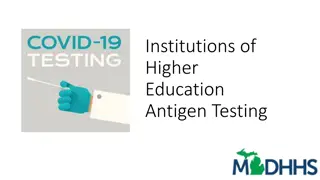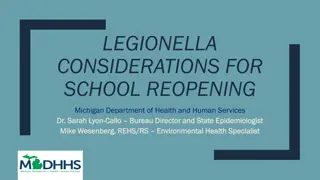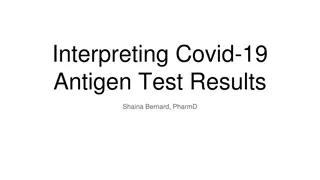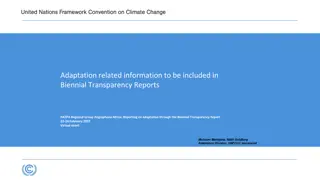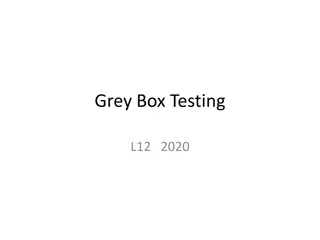Resilience, Adaptation, and Reopening: Rapid Antigen Testing Overview
Understanding the importance of rapid antigen testing in the context of resilience, adaptation, and reopening during the ongoing COVID-19 pandemic. Exploring the benefits of rapid screening in detecting asymptomatic carriers, along with the necessity of confirmatory PCR tests for positive results. Highlighting the experiences of Central West Specialized Developmental Services (CWSDS) in implementing rapid antigen screening programs and acknowledging the significance of testing and screening in overall public health efforts.
Download Presentation

Please find below an Image/Link to download the presentation.
The content on the website is provided AS IS for your information and personal use only. It may not be sold, licensed, or shared on other websites without obtaining consent from the author. Download presentation by click this link. If you encounter any issues during the download, it is possible that the publisher has removed the file from their server.
E N D
Presentation Transcript
Resilience, Adaptation, and Reopening: Rapid Antigen Testing
Resilience, Adaptation, and Reopening: Rapid Antigen Testing 12:00 12:05 James Janeiro 12:05 12:15 Developmental Services 12:15 12:20 12:20 12:30 12:30 12:40 12:40 12:50 12:50 1:00 period Welcome & opening remarks - Central West Specialized Community Living Parry Sound Christian Horizons Pooran Law MCCSS Question & answer
Dr. Fiona OSullivan fosullivan@cwsds.ca Sylvia Fattore sfattore@cwsds.ca
Introduction to CWSDS Central West Specialized Developmental Services (CWSDS) is a registered, not-for-profit organization, funded by the Ministry of Children, Community and Social Services (MCCSS) CWSDS. Dr. Fiona O Sullivan fosullivan@cwsds.ca Sylvia Fattore sfattore@cwsds.ca Comprised of various services and supports including onsite and community supported living homes, day services, and community services to help people with intellectual and developmental disabilities and complex needs.
Why Rapid Antigen Screening? Testing and screening, in combination with personal public Dr. Fiona O Sullivan fosullivan@cwsds.ca health measures and vaccination, are important tools to Sylvia Fattore sfattore@cwsds.ca protect Canadians and help limit the spread of COVID-19. Some studies suggest that up to 50% of COVID-19 transmission could be caused by people without symptoms. Rapid antigen tests are easy to administer, and produce results in as little as 15 minutes.
Why Rapid Antigen Screening? They are most effective at identifying those with high viral Dr. Fiona O Sullivan fosullivan@cwsds.ca load and high transmission potential. Sylvia Fattore sfattore@cwsds.ca A positive rapid antigen test result should be confirmed with a diagnostic polymerase chain reaction (PCR) test by local public health authorities.
Rapid Antigen Screening & Acknowledgement Dr. Fiona O Sullivan fosullivan@cwsds.ca Sylvia Fattore sfattore@cwsds.ca PanbioTM Rapid Antigen Screening Pilot December 2020 March 2021 BD VeritorTM Rapid Antigen Screening Program Mid-June 2021 present COVID-19 Resources - The Real Xchange (communitylivingessex.org)
Rapid Antigen Screening Method Encouraged participation from all employees (1 2 times per week) For employees working from both home and office it is recommended once per week. Employees who provide direct support or are in the office full-time, will be encouraged to complete Antigen Screening twice per week. Screening occurs in the work environment Asymptomatic employee may participate Dr. Fiona O Sullivan fosullivan@cwsds.ca Sylvia Fattore sfattore@cwsds.ca
Rapid Antigen Screening Method (contd) Rapid Antigen Testing (BD Veritor ) The Ministry of Health has confirmed that supervised self-swabbing is now an acceptable method of specimen collection for Point of Care Tests (POCT), which include Rapid Antigen Screening Tests. Dr. Fiona O Sullivan fosullivan@cwsds.ca Sylvia Fattore sfattore@cwsds.ca The BD Veritor COVID-19 Antigen Rapid Screening Test consists of self-swabbing by inserting one swab into each nostril at a depth of 2.5 cm. Diagram- Nasal Swab Collection Method Insert swab about 2.5 cm (1 in) inside nares Roll the swab 5 times along the mucosa inside the nostril. Using same swab, repeat for other nostril.
Overview of BD Veritor Rapid Testing Method Dr. Fiona O Sullivan fosullivan@cwsds.ca Sylvia Fattore sfattore@cwsds.ca 1. 2. 3. Self swabbing of nostrils Process swab specimen in processing tube Add 3 drops of the sample fluid to the Test Device Sample Well Set the timer and wait 15-20 minutes Insert Test Device into the BD Veritor Analyzer Machine and the result will be displayed in 3 seconds! 4. 5.
Antigen Screening Method Dr. O Sullivan and the Health Services Nurses facilitated training of all employees at CWSDS utilizing the Train the Trainer model. Dr. Fiona O Sullivan fosullivan@cwsds.ca Sylvia Fattore sfattore@cwsds.ca Training included oversight of self-swabbing, how to operate the test device, PPE requirements and how to safely dispose of waste. A designated screening area was identified within each work environment (19 in total). Quality Control Training was also facilitated.
Antigen Screening Method Each employee is responsible to immediately enter their results on the screening document via the screening QR code. Dr. Fiona O Sullivan fosullivan@cwsds.ca Sylvia Fattore sfattore@cwsds.ca Medical Administrative Assistant is responsible for data entry into the Ontario Health Portal. Disposal of biohazardous materials through Stericycle.
BD Veritor Training Resources CWSDS provided the following resources for all staff: Memorandum- Enhanced Screening Consents as applicable (Employee, People We Support and Family) Agreement of Understanding Rapid Antigen Testing Policy and Addendums (BD Veritor Kits, Performing the Test, Reading and Certifying Results) Quality Control Tracker Safety Information and Troubleshooting BD Veritor Training video developed by Dr. Fiona O Sullivan Ministry Of Health links to training videos Dr. Fiona O Sullivan fosullivan@cwsds.ca Sylvia Fattore sfattore@cwsds.ca
BD Veritor Data Dr. Fiona O Sullivan fosullivan@cwsds.ca Sylvia Fattore sfattore@cwsds.ca Data reflects the time frame of June 14 July 9 *Tests that were confirmed negative through PCR tests Total # of Participants 102 Total # of BD Veritor Rapid Antigen tests completed 255 CWSDS engaged in a graduated start to ensure comprehensive BD Veritor training for all staff members.
Staff Questions & Feedback As our approach at CWSDS to antigen screening is messaged as highly encouraged and is voluntary, we did not encounter significant resistance to participation. Dr. Fiona O Sullivan fosullivan@cwsds.ca Sylvia Fattore sfattore@cwsds.ca As the BD Veritor Rapid Antigen Screening test is less sensitive and specific than lab-based PCR tests, results are not as accurate Why are we using it? Would it not be favorable to receive a PCR test, which is more reliable? What is the frequency of supportive living staff to be screened and how will this be monitored? If a result is positive for COVID-19 and retesting via PCR is negative, will staff be compensated for their time off? How will it be addressed if not followed?
Jo-Anne Demick jdemick@clps.ca
Jo-Anne Demick jdemick@clps.ca
Gregory Crunican gcrunican@christian-horizons.org
Rapid Antigen Screening Pilot Program RANT screening vs. testing Gregory Crunican gcrunican@christian-horizons.org Our approach for testing over large geographical area Training Waste management Data collection
Cheryl Wiles Pooran cwpooran@pooranlaw.com
Testing in the Workplace: Case Law Update December 2020 Caressant Care Nursing Homes v. C.L.A.C. Upheld employer s decision to institute bi-weekly surveillance testing in retirement home (following a government recommendation). Policy used a bi-weekly nasal swab for all workers, with medical exceptions. Employees who refused the test would be held out of work without pay until they took the test. Arbitrator upheld policy as reasonable infringement on employee privacy given the risk of COVID-19. Employer did not have to wait until an outbreak occurred to show that the policy was needed they could implement it proactively. Key implications for vaccination policies indicates an openness to intrusive employer policies that increase health and safety related to COVID 19. Cheryl Wiles-Pooran cwpooran@pooranlaw.com
Testing in the Workplace: Case Law Update Cheryl Wiles-Pooran cwpooran@pooranlaw.com June 2021 Ellisdon Construction Ltd. v Labourers International Union of North America, Local 183 The union challenged twice-weekly rapid antigen testing as being an unreasonable intrusion on employee privacy In dismissing the grievance the Arbitrator cited the following reasons: Severe and ongoing threat of COVID-19 in the province Employer had minimized the intrusion by only swabbing the lower nose and throat Measures taken by the employer to ensure employee safety and privacy while the tests were being taken
Kelly Huntington kelly.huntington@ontario.ca Ashley Chilvers ashley.chilvers@ontario.ca
Provincial Antigen Screening Program (PASP) In collaboration with the Ministry of Health (MOH) and stakeholders, Ministry of Children, Community and Social Services (MCCSS) continues to support voluntary participation in the PASP in accordance with the program eligibility requirements determined by MOH. Kelly Huntington kelly.huntington@ontario.ca Ashley Chilvers ashley.chilvers@ontario.ca PASP supports enhancing public health and safety through the provision of rapid antigen screening tests to proactively identify potential cases of COVID-19 among asymptomatic individuals that may otherwise go undetected by routine screening measures (e.g. symptom screening).
Provincial Antigen Screening Program (PASP) PASP is intended to be an added screening tool for service providers to enhance their existing Infection Prevention and Control measures for individuals living, participating and working in congregate settings or receiving in-person services. Kelly Huntington kelly.huntington@ontario.ca Ashley Chilvers ashley.chilvers@ontario.ca Participation by MCCSS service providers is voluntary and participants have flexibility in how they implement the program within their setting(s) so long as they adhere to the parameters outlined by the Ministry of Health.
Provincial Antigen Screening Program (PASP) Rapid antigen tests are used for asymptomatic screening purposes only and should not be used for diagnosis of COVID-19 infection in symptomatic individuals or individuals with known contact with a positive COVID-19 case. Kelly Huntington kelly.huntington@ontario.ca Ashley Chilvers ashley.chilvers@ontario.ca MCCSS administrates a separate onboarding and distribution system for rapid antigen tests outside of MOH s central PASP system. As of July 15, 2021, there are approximately 80 agencies with over 350 locations are participating using ~13,300 tests per week (at scale).
Provincial Antigen Screening Program (PASP) There have also been 30 preliminary positive asymptomatic cases of COVID-19 identified in MCCSS participant organizations through the PASP program. Kelly Huntington kelly.huntington@ontario.ca Ashley Chilvers ashley.chilvers@ontario.ca Service providers that are interested in participating in the PASP may submit an expression of interest here. For more information on the PASP please go to the Provincial Guidance for Antigen Screening in Ontario.
Resilience, Adaptation, and Reopening: Rapid Antigen Testing
